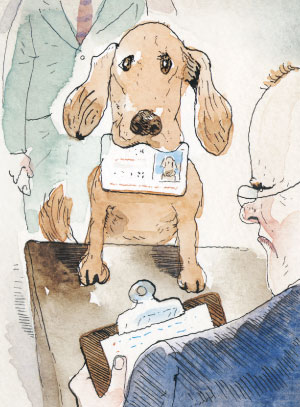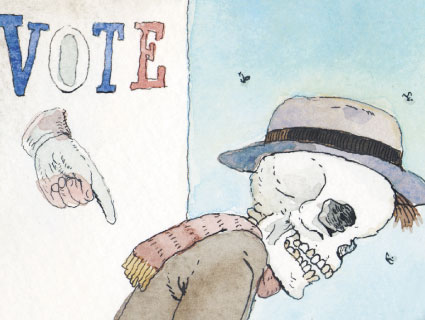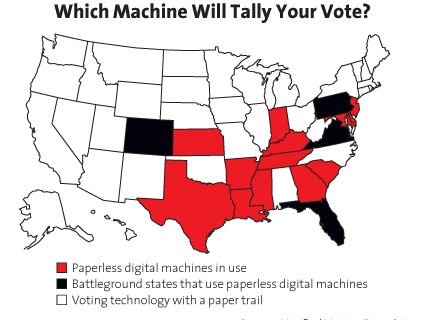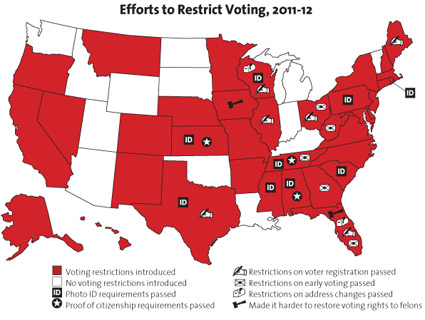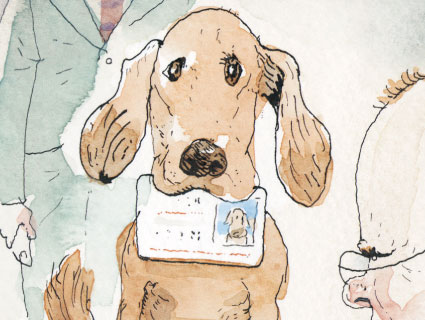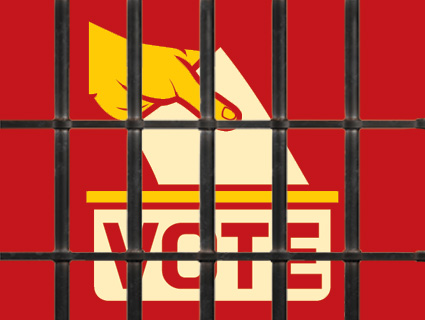
<a href="http://www.shutterstock.com/pic-101702437/stock-vector-vote-label-vote-symbol-vote-icon-ballot-box-hand-putting-a-voting-ballot-in-a-slot-of-box.html?src=af36bf05e1504105b61f365fc1f4306e-1-1">Tribalium</a>/Shutterstock; <a href="http://www.shutterstock.com/pic-50324902/stock-photo-aged-prison-bars-with-clipping-paths.html?src=csl_recent_image-2">Eduard Härkönen</a>/Shutterstock
If the GOP prevails in the Sunshine State on November 6, it won’t be because of hanging chads—though there have been plenty of issues with Florida’s paperless digital machines. Instead, it might owe something to Gov. Rick Scott’s now infamous voter and the restrictive new voting laws Florida passed last year. Or the fact that about a million voting-age Floridians will be sitting on their hands this Election Day—permanently stricken from the voting rolls because they were once convicted of a felony.
Among the GOP’s myriad strategies to suppress the vote of people considered more likely to vote Democrat—many of them detailed by Kevin Drum and others in —felony disenfranchisement laws may be the biggest bonanza of all for Republican candidates. The United States incarcerates more of its citizens than another other nation. Some 2.3 million Americans are now in prison or jail, with millions more on parole or probation—together, according to a 2009 study, they account for , most of whom would otherwise be eligible to vote.
Florida leads the pack in the number of citizens excluded. But according to the Brennan Center for Justice, 48 states (exceptions: Maine and Vermont) prohibit current prisoners with felony convictions from voting and 29 of them also bar those on probation or parole. All told, felony disenfranchisement prevents more than from voting. And of the four states that permanently bar voting by former felons—Kentucky, Florida, Iowa, and Virginia—the latter three are battleground states.
The Supreme Court has ruled on the issue twice. In 1974, it determined that denying felons the right to vote was an “affirmative sanction” allowable under the 14th Amendment. A decade later, the justices struck down a provision of the 1901 Alabama constitution that prohibits from voting any individual convicted of “any crime involving moral turpitude”—not because it disenfranchised a large portion of the population, but because the provision reflected “purposeful racial discrimination.”
In other words, states can disenfranchise their citizens so long as the laws don’t have a discriminatory intent. But the effect, as noted in a brief from the American Constitution Society, can be racially biased nonetheless. For instance, black men make up 36 percent of the nation’s disenfranchised population, but just 6 percent of the nation’s general population. “While today’s felony disenfranchisement laws are facially neutral,” the brief states, “many are inherited from an underlying legacy of racist voting restrictions.”
For a while, it looked like things were changing in Florida. In 2007, Gov. Charlie Crist signed an executive order giving ex-felons a chance to vote provided they went through a cumbersome, expensive, and bureaucratic restitution process. But last year, Gov. Rick Scott reversed the reforms, forcing any former felon who wanted to regain voting rights to appeal directly to the governor. Those with a nonviolent felony must wait five years before applying for a clemency board hearing; others must wait seven years. “Essentially,” the Brennan Center points out, “the new rules give the governor, an elected official, the power to decide who will (or won’t) be allowed to vote in the next election.”
According to Desmond Meade of the nonprofit Florida Rights Restoration Coalition, “Over 1 million people in Florida right now are disenfranchised,” he says. Nearly 1 in 3 of them are African American men. If these people were able to vote, Meade continues, “Florida would no longer be a swing state.”
Florida may have the numbers, but Virginia has perhaps the nation’s harshest disenfranchisement laws. “Part of the problem is that we have inherited laws from around 1850, which simply haven’t been changed,” says Richael Faithful of the Advancement Project, a Virginia group that aims to restore people’s voting rights. She crisscrosses the state holding clinics for activists and lawyers. “It’s in our constitution—a permanent ban on any person convicted of a felony.” At least 378,000 people are affected.
As with Florida, a former felon in Virginia must go sit through a waiting period before applying for clemency to Gov. Robert McDonnell, a Republican. “You get your rights restored in the same way you get an executive pardon,” Faithful says. For certain felonies, you must personally obtain certified copies of court records and pay all restitution fees in full, with interest—including such things as the cost of probation. The application requires specific, detailed information about your convictions and character, reference letters from three non-family-members, and a personal essay explaining to the governor why you deserve the right to vote.
McDonnell has been restoring voting rights at what’s considered a fast pace—1,350 people last year. “Unfortunately, according to our calculations,” says Faithful, “if you had the governor review one application an hour for 24 hours [a day], 365 days a year, it would take him 43 years” to restore everyone’s voting rights. The Richmond Times Dispatch recently told the story of Randy Jefferson Philpott, a moonshiner who satisfied all his legal obligations in 1992 and had his voting rights restored in 2011—19 years later.
In Iowa, the third swing state in question, there was also an earlier effort at reform, but last year the new governor, Terry Branstad, rescinded an executive order that had returned voting rights to ex-felons. As Kevin Drum ” reported last month, former felons in Iowa must fill out a 31-question application seeking information including the address of the judge who handled the conviction. Felons also must supply a criminal history report, which takes weeks to obtain, and the review itself can take up to six months. Drum writes:
Henry Straight, who wants to serve on the town council in the tiny western Iowa community of Arthur, is among those whose paperwork wasn’t complete. Straight can’t vote or hold office because as a teenager in Wisconsin in the 1980s, he was convicted of stealing a pop machine and fleeing while on bond. Straight spent a year on the effort and hired a lawyer for $500 to help. Yet he was notified by the governor’s office [in May] that he hadn’t submitted a full credit report, only a summary, or documentation showing he had paid off decades-old court costs. “They make the process just about impossible,” said Straight, 40, a truck driver. “I hired a lawyer to navigate it for me and I still got rejected. Isn’t that amazing?”
There’s also the de facto disenfranchisement of hundreds of thousands of Americans who by law still have the right to vote: those in jail, rather than prison. There are 3,000 local jail jurisdictions in the United States, and jails hold some 700,000 people at any given time. Many are there on misdemeanor charges or are being held in pretrial detention because they can’t make bail. Those lacking previous felony convictions have the right to vote, “but inmates don’t have access to voter registration materials or absentee ballots,” says Marc Mauer, executive director of the Sentencing Project.
Charles Sullivan, who heads the nonprofit group Citizens United for Rehabilitation of Errants, has successfully brought together jail and voter-registration officials in DC to help inmates to register and cast their ballots. “At any given time in DC jails, out of 2,500 inmates, about 90 percent are eligible,” Sullivan told the Washington Afro. But “we have never witnessed more than 400 inmates voting for an election cycle.” DC’s system is way out front on inmate voting rights, Sullivan added. “But there are many things that need to be done so that eligible voters inside jails have all the same opportunities to make informed choices.”
Additional reporting by Jennifer Wedekind

